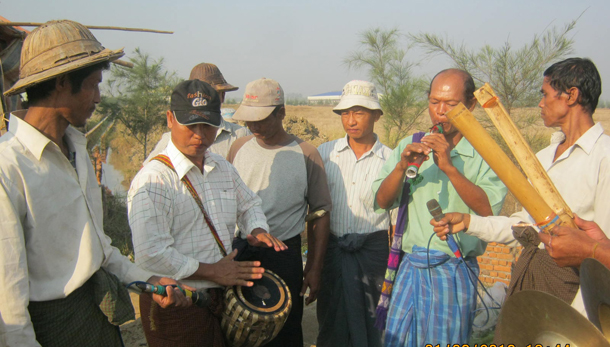RANGOON—Less than eight months after a parliamentary commission began investigating land-grabbing in Burma, it has received complaints that the military has forcibly seized about 250,000 acres of farmland from villagers, according to the commission’s report.
The Farmland Investigation Commission submitted its first report to Burma’s Union Parliament on Friday, which focused on land seizures by the military.
According to the report, the commission received 565 complaints between late July and Jan. 24 that allege that the military had forcibly confiscated 247,077 acres (almost 100,000 hectares) of land. The cases occurred across central Burma and the country’s ethnic regions, although most happened in Irrawaddy Division.
The report said farmlands were confiscated for six different reasons: the expansion of urban areas; expansion of industrial zones; expansion of army battalions and military units; construction of state-owned factories; implementation of state-run agricultural and animal husbandry projects; and land allocation to private companies with links the military.
The commission recommends that undeveloped lands are returned to their owners or handed over to the state. In cases where land has been developed, affected farmers should receive adequate compensation from the military, the report said.
Pe Than, Lower House MP for the Rakhine Nationalities Development Party and a commission member, said Burma’s military Commander-in-Chief Min Aung Hlaing has acknowledged that the military has been involved in land seizures in the past and would seek to address the issue.
“When I met with Vice Sen-Gen Min Aung Hlaing at the end of February, he confirmed to me that the army will return seized farmlands that are away from its bases, and they are also thinking about providing farmers with compensation,” he said.
Pe Than said the parliamentary report on military land grabs was submitted to Parliament first because these cases are less complex, have complete data and are more obvious to prove. Further parliamentary reports on other forms of land-grabbing are due to follow.
Lower House member Thein Nyunt said parliamentarians would discuss land-grabbing issues and possible amendments for the existing land laws in coming weeks. “Compensation for confiscated land will be on the agenda, too,” said the opposition MP.
Burma’s military junta ruled the country for decades and land seizures by the army were widespread and local dissent was brutally crushed.
After a nominally civilian government took over 2011, the military let it be known that it would end such practices, but whether it will do so remains to be seen. Land-grabbing by powerful private companies meanwhile, has increased rapidly in the wake of Burma’s socio-economic reforms.
Land rights activist Han Shi Win said Burmese law states that the military should return unused farmlands and compensate for seized land.
“Article 31 of the Farmland Law states that if no work is done on a confiscated land within six months, the land shall be returned to its owner. That’s why we are trying to bring back land to farmers,” he said. “But the army does not follow the law.”
Han Shi Win said the Central Land Management Committee, chaired by Minister for Agriculture and Irrigation Myin Hlaing, had done little to properly implement the law in land seizure cases.
The activist warned that if the long-festering land grabbing complaints were not dealt soon angry farmers might resort to violent protests, such as in Irrawaddy Division’s Maubin Township, where dozens were injured and a policeman killed when villagers clashed with security forces on Feb. 26.
In the Irrawaddy Delta, farmers are becoming increasingly bold in demanding back their land or compensation, now that the government is becoming more tolerant towards public protest.
During a government ceremony to mark Peasants Day on Saturday, about 700 hundred villagers from Shwepyitha Township, located on the northern outskirts of Rangoon, came to demand that authorities resolve their complaints.
Supported by the local Diversity Party, they handed out pamphlets stating that 1,742 farmers lost about 11,000 acres (4,422 hectares) since 1986 to private companies, such as Zay Ka Bar, Yuzana Group and Htoo Group—the latter firm is owned by Tay Za, a business crony of the former junta.
The groups’ leader San Win Myint said the farmers demanded that authorities to resolve the complaints which they sent to the Rangoon Division’s Land Seizures Inquiry Commission.
“We are celebrating Peasants Day here … but we don’t have any plot of farmland,” he added bitterly.
Aung Thein Lin, a member of the Rangoon Division Land Seizures Commission who was attending the ceremony, told reporters that the complaints were being dealt with in accordance to law and that farmers could get compensated for the value of the land at the time of confiscation.
“We … are now making inquiry about land grab situation in Shwepyitha Township. After that, we will send the report to Parliament,” said the Lower House MP, who belongs to the ruling Union Solidarity and Development Party.
Khin Maung, a farmer from Lein Kone village in Shwepyitha Township, said the community would not accept the paltry compensation sums that the government was likely to offer.
“We will only have 800 kyats [US $0.93] per acre under the existing law for my land that was grabbed,” he said. “It is not fair for us to get such low compensation.”
Khin Maung warned that if farmers’ demands were not met, they would retake control of their old lands. “We will start to plant our farm plots again in 2013,” he said.
















